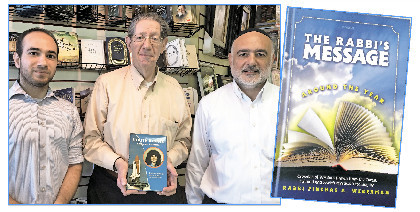A Miami rabbi’s Purim message
On my recent trip to Miami Beach I had the opportunity to visit the only Jewish bookstore in town, Torah Treasures, and speak to its wonderful owners, Yakov and Sammy Selanikio.
This father and son team is among the most informed bookstore owners whom I have encountered in quite some time. And, because of them we have this week’s review.
Among the literary works that they brought to my attention was one by one of Miami’s longtime spiritual leaders, Rabbi Pinchas Weberman. Rabbi Weberman’s rabbinic career goes back to 1960; since then, he’s been serving the Ohev Shalom Congregation. In addition he also taught at the Yeshiva Gedola of Miami, Toras Chaim of Miami, and the Bais Yaakov of Miami, and he served as a police chaplain for the Miami Beach Police Department.
Sammy brought to my attention Rabbi Weberman’s anthology of his teachings entitled, “The Rabbi’s Message,” containing over 200 original sermons, lessons and homilies themed to the Jewish calendar as well as lessons for daily life.
Given the time of year, I will present a brief selection of the rabbi’s teachings relating to the upcoming Purim holiday.
The first selection is refers to a verse found in the Book of Esther, 9:22: “They should make them days of feasting and joy and sending gifts to one another.”
Rabbi Weberman relates the following:
“Purim celebrates the Jews being saved from destruction by a fierce, powerful enemy. It is easy to understand why Mordecai and Esther instituted reading of the Megillah and celebration with feasting and gladness. As with every historical event on our religious calendar, we experience a personal reliving of the past events as we celebrate Purim. We rejoice as if we ourselves actually were released from such a terrible threat.”
The rabbi continues: “But we need to understand the need for exchanging gifts. What connection does giving have with the events of Purim?” He then presents to us another teaching based on the following verse from Midrash Shmuel, 9:2: “All festivals may be cancelled but Purim never will.”
Rabbi Weberman observes:
“Purim stands out among the other festivals. Labor is forbidden or restricted on other holidays. Work is not prohibited on Purim. It would seem that the restrictive nature of the other festivals would imply their greater value and they should never be put in disuse. It would also seem that the lighter nature of Purim would make it more dispensable.”
However, the rabbi cautions us with this: “Purim with its lenient nature is more vital to our spiritual enrichment than the others although they are more restrictive.”
After going into an involved teaching explaining his thesis, Rabbi Weberman concludes:
“Purim commemorates a time when our people dedicated themselves to the Torah with all their souls. It is celebrated like an ordinary weekday with the joy and devotion no less intense than that of the other festivals. …
“We celebrate Purim with joy and devotion. It should set a pattern for us to bring this devotion to the ordinary circumstances of our everyday lives to make them all blessed with joy and happiness.”
Lastly, we have this most perceptive observation:
“We fervently, with great emotion, recite the Psalms when we find ourselves in need, pleading to G-d for his Divine help. With equal fervor and emotion, we sing praises of thanksgiving when our requests are fulfilled. In the thousands of years since Mordecai and Esther, our people have experienced both good and bad times. At no time was the voice of the Megillah stilled. It rang out loud and clear both in darkness and in light.”
“These days of Purim will never cease among the Jews nor shall their remembrance perish from their descendants.” (Esther 9:28)

 54.0°,
A Few Clouds
54.0°,
A Few Clouds 




